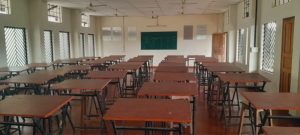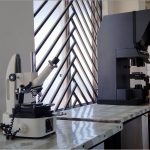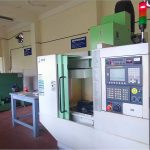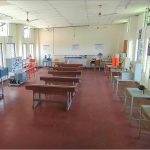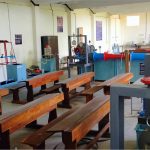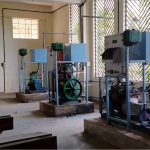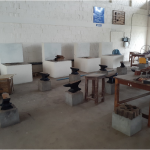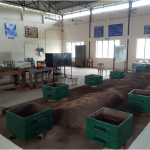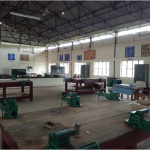Lab In charge: Prof.Razeek A Lab Instructor: Mr. Aliyarkunju O
The manufacturing technology lab encourages students to study and practice the various machining operations that can be performed in lathe, shaping, drilling, milling, grinding, etc. and equip students with the practical knowledge required in the manufacturing/production companies. The Machines Laboratory provides necessary practical hands-on training in conventional machine tools to practice various types of tools, manipulate and control various process parameters during machining processes, and acquire its applicability in the real-time components manufacturing Industries.
List of Equipments
| SL.NO. |
NAME OF EQUIPMENT |
QUANTITY |
| 1 | LATHE | 10 |
| 2 | SHAPER | 3 |
| 3 | UNIVERSAL MILLING MACHINE | 2 |
| 4 | VERTICAL MILLING MACHINE | 1 |
| 5 | SLOTTING MACHINE | 1 |
| 6 | HYDRAULIC SURFACE GRINDING MACHINE | 1 |
| 7 | HYDRAULIC CYLINDRICAL GRINDING MACHINE | 1 |
| 8 | HEAVY DUTY RADIAL DRILLING MACHINE | 1 |
| 9 | POWER HACKSAW | 1 |
| 10 | PILLAR TYPE DRILLING MACHINE | 1 |
| 11 | BENCH GRINDER | 1 |
| 12 | PRECISION TOOLS CNC LATHE | 1 |
| 13 | PRECISION TOOLS CNC MACHINING CENTRE | 1 |
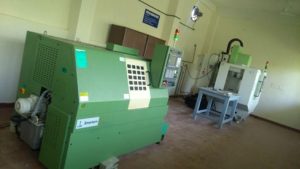
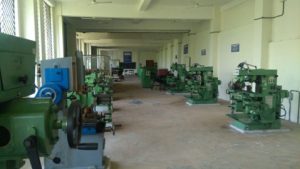
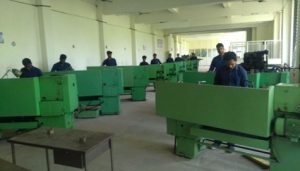
Lab in charge: Ms. Lakshmi Sasidharan Lab Instructor: Mr.Alexander S
Metrology & Instrumentation Lab is equipped with various measuring instruments, gauges and measuring machines. It makes the students understand the basic principle involved in measuring process that suits the respective product and its importance in the quality control.
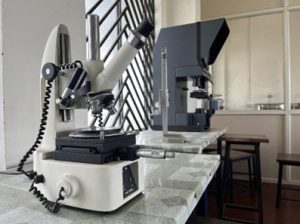
Lab In charge: Mr. Jakie Sheraf Lab Instructor:P K Vijayamohan
An expertly maintained space where students can explore the mechanisms and principles behind various thermomechanical devices. This lab provides hands-on learning experiences with:Internal Combustion Engines (SI and CI)Multi-Stage Compressors, Calorimeters and much more. Our lab is designed to enhance students’ theoretical knowledge and practical skills, offering a comprehensive understanding of thermal engineering.
List of Equipments
- Single Cylinder Kirloskar Diesel Engine
- Single Cylinder Field Marshal diesel Engine
- Multi cylinder Isuzu Petrol Engine
- Reciprocating Air Compressor Test Rig
- Bomb Calorimeter
- Junker’s Gas Calorimeter
- Redwood Viscometer
- Cleaveland Flash and Fire point Apparatus
- Vapour Compression Refrigeration Test rig
- Vapour Compression Air-Conditioning Test rig
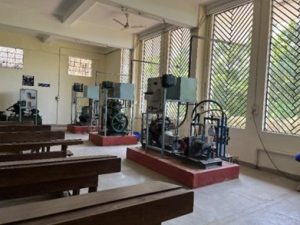
Lab In charge: Mr.Vysakh Raveendra Kurup Lab Instructor: Aliyarkunju O
Thermal Engineering lab 2 gives a practical perception of various Heat transfer modes such as Conduction, Convection, and Radiation and the lab is well equipped with experimental tests for a better understanding of thermal engineering principles.There are experimental setups for measurements and analysis of
- Heat transfer through Composite Wall Apparatus
- Thermal Conductivity of metal rod apparatus
- Thermal Conductivity of insulating powder Apparatus
- Emissivity Masurement Apparatus
- Natural Convection Apparatus
- Forced Convection Apparatus
- Stefan Boltzmann’s Apparatus
- Critical Heat Flux Apparatus
- Parallel flow and Counter flow Heat Exchanger Apparatus.
- Vapour Compression Refrigeration test rig
- Vapour Compression air conditioning test rig
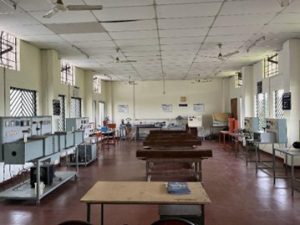
Lab in charge: Mr.Vysakh Raveendra Kurup Lab Instructor: P K Vijayamohan
The lab facilitates students to experience hands-on experience on various basic priciples of dynamic mechanisms in day to day life. Lab enables students to understand the static and dynamic balancing of machine parts, the dynamic behavior of moving objects, and the analysis of mechanisms in machine tools and automobiles.The lab comprises of the experiment setup for testing whirling of shaft, gyroscope, governor and vibration apparatus.
List of Equipments
- Whirling of shaft apparatus
- Universal Governor apparatus
- Motorized Gyroscope apparatus
- Free and forced vibration apparatus
- Basic Pneumatic Trainer Kit
- Stepper Motor Apparatus
- Servo Motor Apparatus
- Liquid penetration test kit
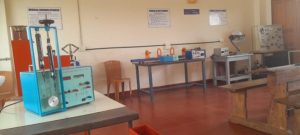
Lab In charge: Ms. Lakshmi Sasidharan Lab Instructor: Mr. Binu C
This laboratory focuses primarily on the detailed engineering of 3D models and/or 2D drawings of physical components using CAD software, but it is also utilized throughout the engineering process, from the conceptual design and layout of products to the definition of manufacturing methods for components. . Along with that the laboratory also focuses on analysis using Finite Elements Analysis and Computational Fluid Dynamics.
| Equipment No. | Major Equipments | Quantity |
| 1 | Computer | 30 |
| 2 | AutoCAD (Software) | 30 |
| 3 | CREO 2.0 (Software) | 30 |
| 4 | Ansys 15 (Software) | 30 |
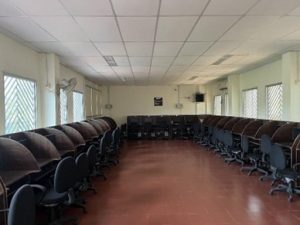
Lab In charge: Ms. Nadeera M Lab Instructor: Mr.Alexander S
The Fluid Mechanics and Hydraulic Machine Lab is a vital component of engineering education, offering hands-on experience with the principles and applications of fluid dynamics and hydraulic machinery. This lab provides a practical understanding of fluid behavior, flow characteristics, and the performance of hydraulic devices through various experiments and demonstrations.
In this lab, students explore fundamental concepts such as Bernoulli’s principle, fluid statics and dynamics, and the analysis of flow through pipes and open channels. Experiments include measuring flow rates, observing laminar and turbulent flow, and investigating the forces exerted by fluids on surfaces. Additionally, the lab covers the operation and efficiency of hydraulic machines like pumps, turbines, and fluid meters
List of Equipments
- FLUID MECHANICS LAB
| Equipment No. | Major Equipments |
| 1 | Venturimeter Apparatus |
| 2 | Orifice-meter Apparatus |
| 3 | Notch Apparatus |
| 4 | Orifice Tank Apparatus |
| 5 | Pipe Friction Apparatus |
| 6 | Pipe Fittings Apparatus |
| 7 | Metacentric Height Apparatus |
| 8 | Bernoulli’s Apparatus |
| 9 | Reynold’s Apparatus |
- HYDRAULICS MACHINES LAB
| Equipment No. | Major Equipments |
| 1 | Pelton Wheel Test Rig |
| 2 | Francis Turbine Test Rig |
| 3 | Kaplan Turbine Test Rig |
| 4 |
Centrifugal Pump Test Rig |
| 5 | Multistage Centrifugal Pump Test Rig |
| 6 | Reciprocating Pump Test Rig |
| 7 | Gear Pump Test Rig |
| 8 | Impact of jet of water on vanes |
| 9 | Hydraulic Ram |
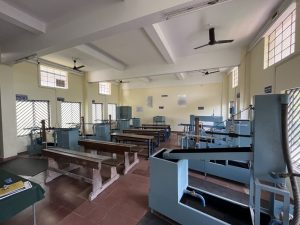
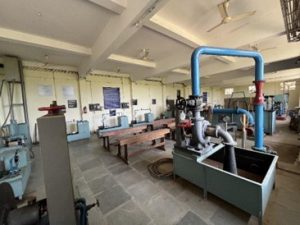
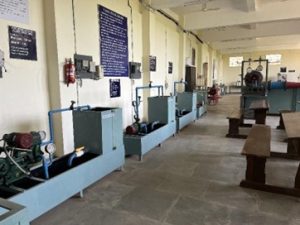
Lab in charge: Mr.Deepu Chandran Lab Instructor: Mr.Binu C
To equip students with the basic workshop skills of creating, assembling various metal and wooden models.These workshops serve as essential learning platforms, offering hands-on experience in various aspects of mechanical engineering. These lab inculcates the basic safety procedures that should be followed while utilising a lab with proper safety gears.
- Fitting Shop
- Carpentry Shop
- Welding Shop
- Smithy Shop
- Sheet metal Shop
- Plumbing Shop
- Foundry shop
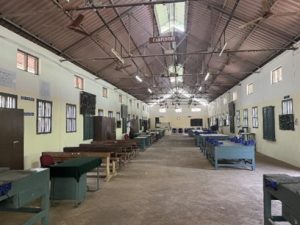
An engineering drawing hall is a specialized space designed to facilitate precise and detailed technical drawing. The space designed to support the technical and creative needs of engineering students, professionals, and enthusiasts. With a seating capacity of 45, this dedicated facility is optimized for drawing, drafting, and visualizing engineering concepts and designs.
Space Details
- Seating Capacity: 45 students
- Area: Approximately 1200 to 1500 square feet (111 to 139 square meters) to accommodate drawing tables, aisles, and circulation space.
- Ceiling Height: Minimum 12 feet (3.6 meters) for adequate ventilation and lighting.
Furniture and Equipment
- Drawing Tables: Sturdy, adjustable drawing tables with individual storage compartments for drawing instruments.
- Drawing Boards: Individual drawing boards of standard sizes (A1, A2, etc.) for each student.
- Chairs: Comfortable and adjustable chairs with proper back support.
- Instructor’s Table: A large table for the instructor, preferably at the front of the hall.
- Whiteboard : For presentations and demonstrations.
- Storage Cabinets: For storing drawing equipment, supplies, and project materials.
- Lighting: Adequate natural light, supplemented by artificial lighting (fluorescent or LED) to avoid glare and shadows.
- Ventilation: Proper ventilation system to maintain a comfortable and healthy environment.
- Electrical Outlets: Sufficient electrical outlets for computers, projectors, and other equipment.
- Drawing Instruments: A set of basic drawing instruments for each student (optional, depending on the curriculum).
